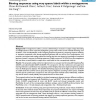Free Online Productivity Tools
i2Speak
i2Symbol
i2OCR
iTex2Img
iWeb2Print
iWeb2Shot
i2Type
iPdf2Split
iPdf2Merge
i2Bopomofo
i2Arabic
i2Style
i2Image
i2PDF
iLatex2Rtf
Sci2ools
113
click to vote
BMCBI
2008
2008
Binning sequences using very sparse labels within a metagenome
Background: In metagenomic studies, a process called binning is necessary to assign contigs that belong to multiple species to their respective phylogenetic groups. Most of the current methods of binning, such as BLAST, k-mer and PhyloPythia, involve assigning sequence fragments by comparing sequence similarity or sequence composition with already-sequenced genomes that are still far from comprehensive. We propose a semi-supervised seeding method for binning that does not depend on knowledge of completed genomes. Instead, it extracts the flanking sequences of highly conserved 16S rRNA from the metagenome and uses them as seeds (labels) to assign other reads based on their compositional similarity. Results: The proposed seeding method is implemented on an unsupervised Growing Self-Organising Map (GSOM), and called Seeded GSOM (S-GSOM). We compared it with four well-known semi-supervised learning methods in a preliminary test, separating random-length prokaryotic sequence fragments samp...
| Added | 09 Dec 2010 |
| Updated | 09 Dec 2010 |
| Type | Journal |
| Year | 2008 |
| Where | BMCBI |
| Authors | Chon-Kit Kenneth Chan, Arthur L. Hsu, Saman K. Halgamuge, Sen-Lin Tang |
Comments (0)

